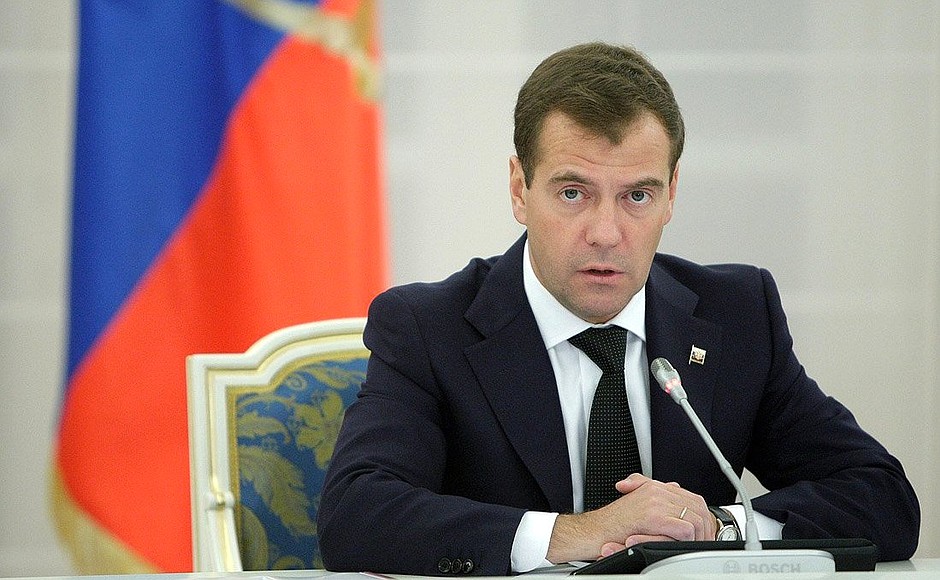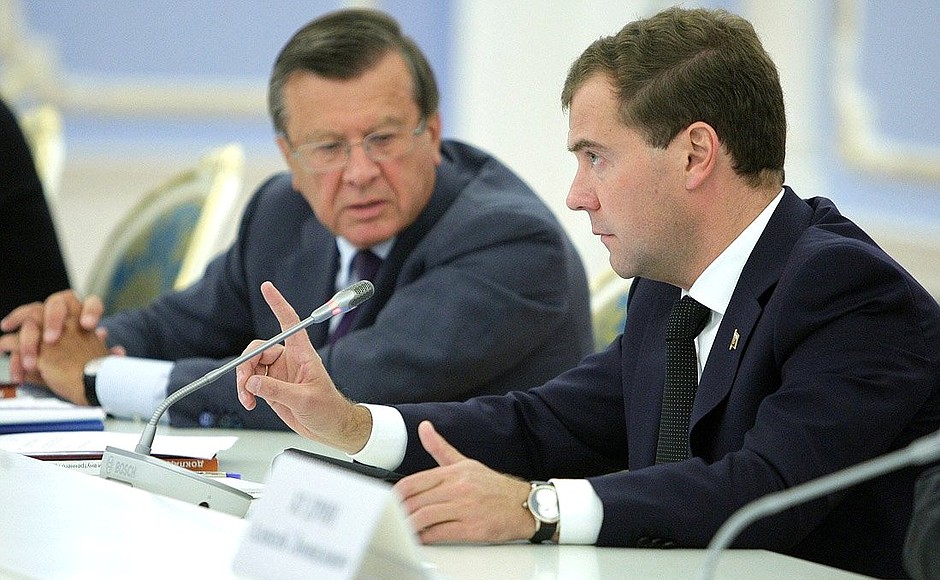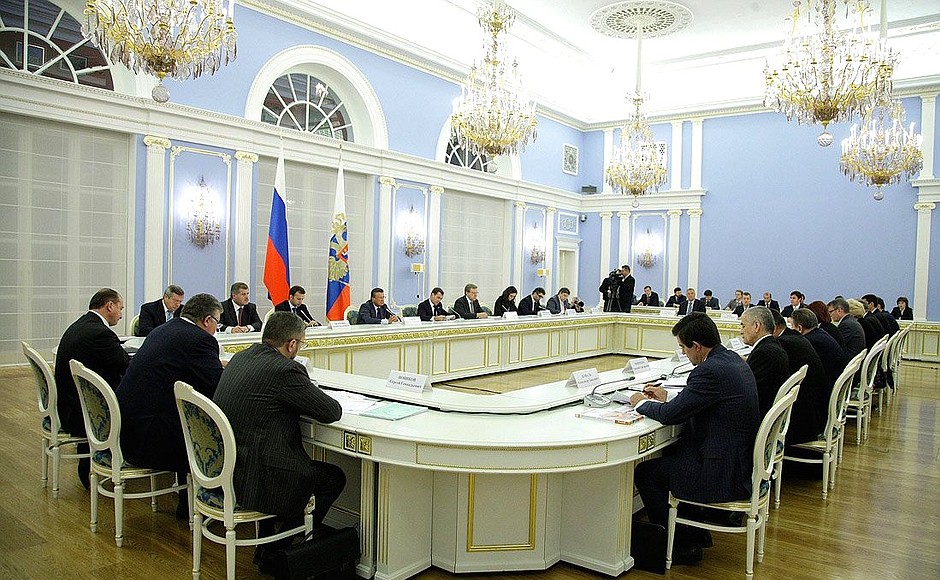President of Russia Dmitry Medvedev: We have been focusing on the problems of agribusiness for the past two months or so because of severe weather conditions and wildfires. Naturally, it is always at the centre of our attention but recently our efforts have been more vigorous that usual. During my trips around the country I visited farms and processing plants in Belgorod, Taganrog, Saratov, Voronezh and Murmansk — indeed, in a whole scope of regions, starting from the north and ending in the south.
At the meetings we discussed the issues associated with the effects of the abnormal heatwave, ranging from harvesting to processing and pricing policies. I remind you that this year's crop failure occurred on approximately 17 percent of the total sown area, or about one third of the area sown to grain crops. The Government estimates that 22,000 farms were affected, which is a huge number.
In order to address this situation, I issued a number of specific instructions. It was necessary to create normal working conditions for agricultural enterprises, to preserve the crop area and to prevent a reduction of cattle. Some of these objectives have been achieved, while others require further efforts.
What has been achieved to date? I would like to indicate five areas. First, 35 billion rubles [$1.13 billion] have been allocated, of which 25 billion rubles are budget loans and 10 billion rubles are subsidies to compensate for the damage. About 15 billion rubles worth of budget loans have already been transferred to the regions, and further 20 billion rubles will be transferred by the end of October. The regions have been able to allocate independently 10 billion rubles. Today I would like to hear how these funds are being used. It is essential that the spending be strictly targeted for the purchase of fodder, seeds, fertilisers, oil and lubricants — basically, where the assistance is required following this difficult summer. We have allocated 1.1 billion rubles for this purpose in the current year’s budget and 8 billion annually in 2011 and 2012. I hope this will allow agricultural producers in the areas affected by the drought to restructure some 100 billion rubles of their debts.
Perhaps the most important goal, one I have repeatedly returned to, is to restore the solvency of agricultural producers. We have been focusing on this issue for a long time, and we have spent significant funds at the start of the Agriculture National Priority Project, and later in the framework of our efforts on the state programme for rural development. I have spoken about this in the past and I will say it again: we must not lose what has been achieved over the past five years. That would be unacceptable. I expect financial institutions to address this issue promptly and constructively. That is why representatives of major banks that work with rural areas are present here.
Secondly, the issue of loan extensions has been resolved, as well as support for the affected areas with winter sowing in the necessary timeframe. About 70 percent of the state programme annual limits have been transferred already, which is more than 70 billion rubles.
Agricultural producers have approached me with the request to subsidise railway tariffs and I issued instructions to the Government. As a result, the Government issued a resolution to subsidise railway tariffs for the transportation of grain and grain products. In the near future, grain from southern Russia and Siberia will be delivered to drought-affected regions. I would like to hear about the transportation, the logistics, because the main issue raised by agricultural producers at our meetings was that there were holdups and, for whatever reasons, they were unable to either buy the grain or to sell it. I know that the Government has been monitoring these processes. I would like to hear your report on what has been done.
In addition, we are continuing with our efforts on financial rehabilitation of agricultural producers. The programme involves more than 6,500 enterprises with total debt amounting to 21.4 billion rubles. Approximately three quarters of this debt is taxes and tariffs arrears. We must continue these efforts.
And finally, the last aspect is the embargo on the export of grain crops. This embargo was a difficult decision but it was necessary, although the embargo is not the only measure to stabilise the market. This is understandable. This measure, as I have already said, may be lifted when we have the final data on the harvest and a more clear understanding of our stocks. I look forward to receiving proposals from the Government.
I would like to draw the attention of the Presidential Control Directorate to the fact that all the instructions I issued following the meetings on agribusiness must be accomplished on time, and I want those efforts to be strictly monitored.
In parallel with the meetings, I followed the situation on the food market. In virtually every region I visited, I went into supermarkets and shops and checked the situation. In some regions the picture I gained was absolutely objective while in others attempts were made to sugarcoat it, but in any case one thing that became abundantly clear was that there were no dramatic changes going on. In some areas there was growth in selected product groups, particularly with some types of cereals, such as buckwheat. I know that the Federal Antimonopoly Service and other agencies have started to investigate this. It is vital to deal with it competently and to punish the profiteers, but in general the situation is quite balanced.
It is essential that the regions (a number of regional governors are present here today) carefully monitor the situation in the food market, track it literally on a daily basis to make sure that the prices for staple foods, including bread, remain stable. This can be achieved in different ways, by providing discounts or through other subsidies, but these ways of supporting low-income population groups are used almost everywhere. I think this is right, especially since, as we are all aware, it is easier for some people to pay 20 to 30 percent more for premium brands of bread than for the poor to pay one or two rubles more than, say, in the previous month. In other words, there must be different types of bread and other products: there must be economy options targeted at low-income customers, but there can also be other types of bread. The Governors and businesses must decide together on ways to balance these two categories of products.
I would like to make a few final points. We have been addressing issues of insurance, agricultural insurance and other types of insurance, which were discussed at a meeting I held here in Moscow. Now we need to bring this matter to conclusion, including the expansion of the insured crop area by at least 50 percent. Of course, this must be done on a voluntary basis but we must tackle this actively. Let me remind you that at present about 17 to 20 percent of crops are insured. There are many reasons for that, I won’t go into them now as we have analysed them in the past. However, it is clear that there will be no need to force agricultural producers to purchase insurance if the policy will be affordable and the insurance guarantees will look solid. At present we have neither the one nor the other. Companies must bear full responsibility for this kind of insurance obligations, creating the conditions necessary for the reinsurance of their risks in agricultural projects, in agribusiness, and in general create what is known as a civilised insurance market.
In this context, there is another important issue: the insurance of rural housing. We have also discussed it and I issued instructions. This type of insurance should be widely used. If we talk in general about home insurance, I can tell you that I am expecting to receive proposals to change the current civil legislation regarding the possible return of compulsory fire insurance. As you know, we abandoned this type of insurance thinking that it was not quite consistent with the idea of insurance as a voluntary commitment. Nevertheless, it is necessary to create some funds, and this summer has taught us a few things in this regard.
At all the meetings I held, be it in Taganrog, Voronezh, Orenburg, Saratov, Murmansk or Belgorod, there were many questions to our services, namely the Federal Customs Service, the Federal Antimonopoly Service and the Federal Service for the Oversight of Consumer Protection and Welfare. I would like the heads of these services to report to me on how they are following the instructions I issued after these meetings.
<…>


